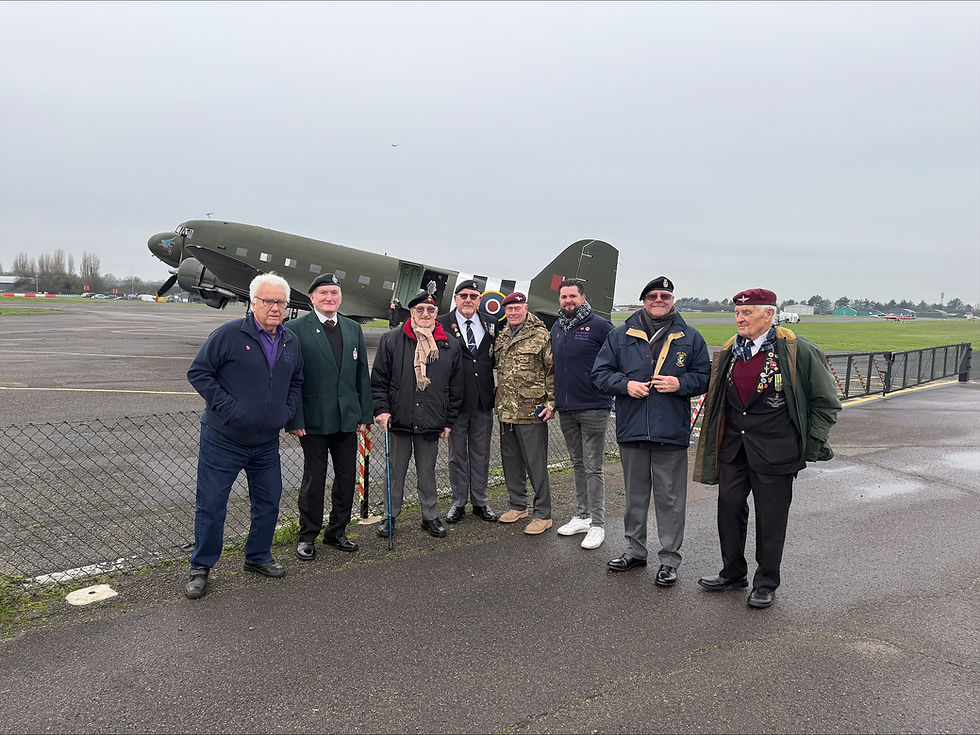WWII veteran John Clarke MBE dies, aged 98
- taxicharity
- Oct 17, 2022
- 3 min read
WWII veteran, John Clarke MBE, from Ware in Hertfordshire died on Wednesday 5 October aged 98.
Born 19 April 1924, John was just 17 when he volunteered for the Black Watch Royal Highland Regiment. When he was old enough to go to war, he travelled widely, fighting in North Africa, Italy and Greece.
In Italy, John was involved in the intense fighting of Monte Cassino, one of the most savage battles of WWII. Serving in Italy between the 1943 and 1945, he was proudly part of the D-Day Dodgers, a famous band of fighting men who inched their way over mountains through mud, snow and rain. It is also suggested that he may have been involved in writing some of the lyrics.
In May 1947, John left the army and moved back to his hometown of Manchester where he returned to work for Metro-Vickers in Trafford and started a family with his late-wife Olive.
Dick Goodwin, vice president of the Taxi Charity, said: "John received an MBE in 2005 in recognition of the courage and bravery he demonstrated on the Italian battlefield and his tireless work over forty years arranging trips back to the Italian region. As secretary of the Monte Cassino Veterans Association, John was behind a fundraising campaign to fund veterans’ pilgrimages so that ex-servicemen could pay homage to their fallen comrades. He lived nearby and was a fabulous raconteur and a true gentleman, and we will miss him very much.”
In February 2021, when the Taxi Charity asked veterans for tales of wartime 'brief encounters', John shared this story of an incident at St Enoch’s Station in Glasgow in the autumn of 1943.
“Sometimes it pays to volunteer, as I did in late autumn 1943, for life was becoming boring in our makeshift camp in Djidjelli in Algeria. We were on the beach doing nothing when an officer approached saying, "I want two volunteers". I looked at my friend Vinnie, he nodded, we both stood up and said, "I will". "Good" said the officer, "get your kit bags, there’s transport ready to take you to Brigade Headquarters". We duly arrived at Brigade HQ and minutes later we were on our way to the harbour, where we boarded the French ship ‘Cuba’ - smelly and ancient - bound for the UK. We were told we would be guarding POWs, who would be imprisoned in the UK.
The trip was uneventful, and we arrived in the Clyde, given seven days leave and train tickets, and told to return to St Enoch’s Railway Station in Glasgow, where transport would take us to our return ship. As I had no home in Manchester to return to, I stayed at the Salvation Army Hostel near the city centre and met old friends, most of whom were working round the clock on war work. But all in all, a happy visit. Time came for me to return to Glasgow, and I duly arrived at St Enoch’s Station about midday.
I was walking along the platform towards the exit when a young lady porter, dressed in station uniform and wearing tight trousers, came speeding past me. About ten yards in front of me, she stopped to pick something up and as she bent down, even though I was carrying my kit bag on my left shoulder, I instinctively gave her a loving smack on her rear end. She stumbled over, I realised my mistake, and put my kit bag down to assist her to her feet. No need, she was up like a shot, eyes blazing, fist in my face, anger in every movement. “Awa ye midden ye” she shouted; nearby passengers gave her support. Then seeing my look of contrition, she did an amazing thing. She put her arms around my neck and gave me a kiss to remember. The passengers clapped and she said: “Come back safely, soldier” as she sped away.
John’s funeral will be held at 12pm on 25 October at Christ Church, New Road, Ware, SG12 7BS. His children Susan and Stephen would welcome those who knew their father and veterans to join them.


















